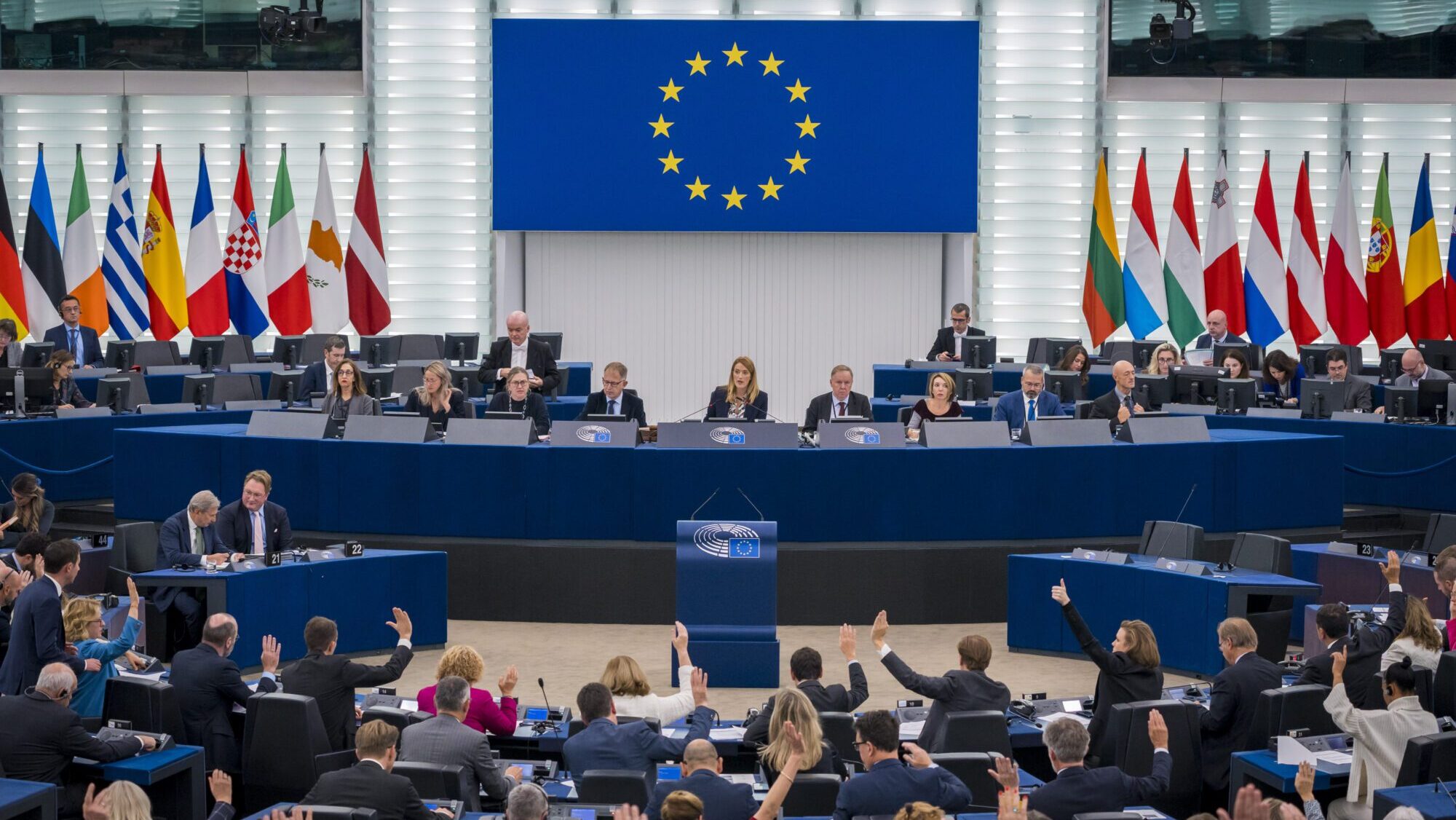
MEPs vote on the Ukraine Facility in the Strasbourg plenary, October 17th.
Photo: Diana Le Lardic ©European Union 2023 – Source: EP
The European Parliament’s plenary adopted the so-called Ukraine Facility, an instrument to provide €50 billion to Kyiv in macroeconomic assistance over the next four years to prepare the country for EU membership, and urged the Commission to find legal ways to expropriate Russian assets to be used as further assistance for the country’s reconstruction. The fate of the EU aid, however, is still tied to the budget revision proposal that EU countries remain skeptical of.
The financial aid package of historic proportions was approved by a large majority in the Parliament, with 512 MEPs voting in favor, 45 against, and 63 abstentions. The majority in nearly all parliamentary groups supported it, while ECR mostly abstained and ID was split between roughly equal amounts of votes in all three categories.
Voted: Ukraine Facility 💪🏻🇺🇦🇪🇺
— MEP Vlad Gheorghe (@VladDanGheorghe) October 17, 2023
We’re taking Putin’a money to rebuild #Ukraine 🙏🏻#Russia #Putinwarcriminal #Romania #EU pic.twitter.com/12w9C6q9NU
According to the Commission’s estimates, the European Union has so far provided Ukraine with over €72 billion worth of aid, including individual assistance from member states as well as expenses allocated to care for Ukrainian refugees.
The Ukraine Facility, however, will be the largest single package of financial aid allocated by the EU itself, aiming to provide Kyiv with €50 billion (€17 billion in direct financial assistance and €33 billion in long-term loans) until 2027.
According to Commission President Ursula von der Leyen, who presented the package during the Ukraine Recovery Conference back in June, these funds—together with the IMF’s $50 billion recovery loan and another $115 billion pledged by the G7—will help Ukraine cover its immediate “fast recovery” needs, allowing it to continue financing the war and support it “on its path toward EU membership.”
The European Parliament also adopted several amendments to address certain concerns regarding corruption in Ukraine and transparency in how the funds would be used, including the creation of a web portal on the financial operations granted to Ukraine, as well as the milestones the country needs to complete in order to get cleared for the subsequent tranches.
Furthermore, the Parliament strengthened certain provisions about the fight against fraud, corruption, conflicts of interests, and specific irregularities that can emerge when using the funds, agreeing that companies under “oligarchic influence” should not be eligible for any funding.
Some MEPs, however, remained skeptical even after all these precautions, accusing the Parliament of propping up an inherently corrupt regime—regardless of being on the Left or Right.
“Our citizens are looking at us because of the increasing interest rates and inflation,” French MEP Thierry Mariani (ID) commented during Monday’s debate in Strasbourg, pointing out that these funds will increase the budget by about 10% for this year alone and will weaken the EU for years.
“Now these funds are essentially being given out to a corrupt political class, all the way up to the top, even to President [Zelensky],” Mariani added referencing reports from Pulitzer-winner investigative journalist Seymour Hersh, who wrote earlier this year that Zelensky embezzled at least $400 million from international financial aid so far.
The sentiment was equally shared by some on the Left. “The €50 billion Ukraine Facility is a rushed, inadequate mechanism, tailor-made for corruption and embezzlement of EU funds on a massive scale,” Irish MEP Mick Wallace (The Left) said, adding that there are simply not enough measures to counter the risks of Ukraine’s “rampant corruption.” He went on to cite the EU Court of Auditors, which said the Facility “fails to demonstrate how the risks [of systemic corruption] would be mitigated.”
Apart from approving the package, the Parliament also adopted a resolution calling for the European Commission to find legal pathways to expropriate the $200 billion worth of Russian assets located in EU central securities depositories that the EU froze following the invasion, to use in Ukraine’s reconstruction efforts—despite legal experts saying there might not even be one.
Furthermore, not even the fate of the €50 billion Facility has been fully decided yet, as the instrument still needs the approval of member states in the EU Council as part of the Commission’s €66 billion budget top-up proposal, which also includes funds for covering rising interest rates and increased operating budget for the EU institutions—which member states are so far hesitant to agree on.
Nevertheless, the Parliament called on the Council to approve the instrument—and the increased budget—as soon as possible, hoping to finalize the process by the end of the year and begin disbursing the funds to Kyiv as soon as the beginning of 2024.
